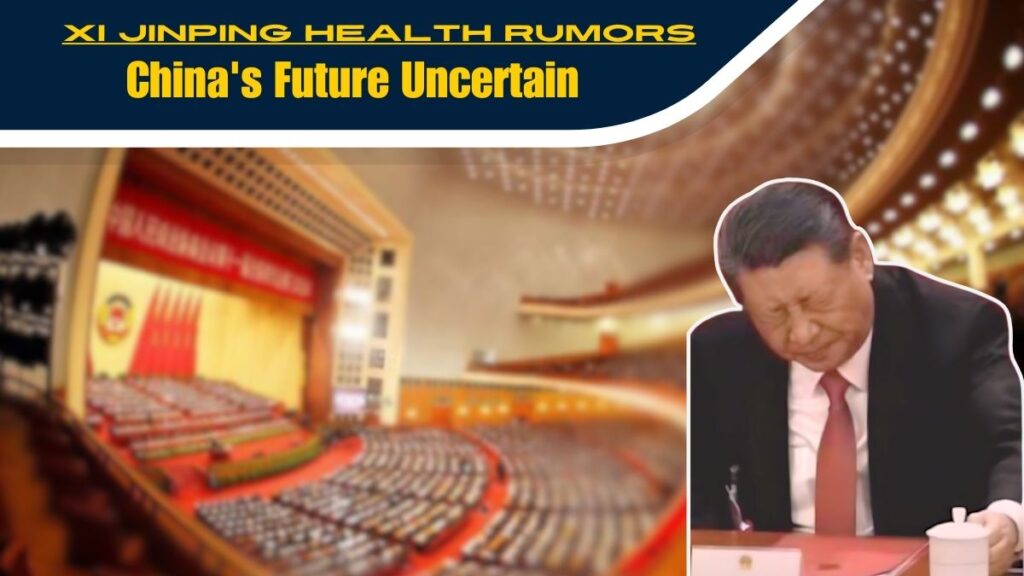The Chinese political landscape is currently awash with speculation and uncertainty, as rumors about President Xi Jinping’s health dominate social media. Reports circulating on Chinese platforms suggest that Xi may have suffered a paralytic stroke, casting a shadow over the ongoing Third Plenary Session of the Communist Party of China (CCP). These rumors, coupled with the lack of official updates, have fueled widespread anxiety and conjecture both within China and internationally.
The Rumors and Their Impact
Social media in China has been buzzing with unconfirmed reports that Xi Jinping collapsed during the plenary session due to a stroke and has been hospitalized since. The severity of his condition remains unknown, sparking further speculation about his ability to continue leading the country. The CCP’s notorious secrecy only adds to the mystery, leaving the Chinese populace and global observers in a state of suspense.
This level of opacity is not unprecedented in Chinese politics, where information is tightly controlled, and state narratives are meticulously crafted. However, the current scenario stands out due to the sheer scale of the speculation and the apparent urgency of the situation.
Economic and Political Repercussions
China’s economy, already facing significant challenges, could be severely impacted by this political uncertainty. The country is grappling with an unprecedented economic crisis, marked by a collapsing real estate sector, failing banks, and a stark urban-rural divide. According to data, 30% of China’s economy is tied to real estate, and the sector’s downfall has caused a ripple effect, leading to the collapse of 40 banks. Many of these banks are now unable to redeem deposits or issue loans, exacerbating the financial strain on the populace.
If Xi Jinping’s health issues render him unable to govern, China’s already fragile economic situation could worsen. The leadership vacuum might delay crucial economic reforms and destabilize the market further. This scenario could have significant implications for the global economy, given China’s integral role in international trade and finance.
Military and Geopolitical Implications
The political instability within China could also have profound geopolitical consequences. Reports suggest that Xi has been wary of potential threats from within the Chinese military, particularly the Rocket Force. This internal dissent highlights the precariousness of his position and the potential for a power struggle within the CCP.
For the United States and its allies, these developments could represent both a challenge and an opportunity. On one hand, a power vacuum in China could lead to increased regional instability, particularly concerning Taiwan. On the other hand, a weakened China might reduce its aggressive posturing in the South China Sea and its economic coercion tactics globally.
Historical Context and Future Prospects
Before Xi Jinping, Chinese leadership transitions were relatively smooth, with a focus on economic development and stability. The previous system ensured that new leaders would come into power every decade, emphasizing economic growth to gain global influence. However, Xi’s tenure has been marked by a shift towards authoritarianism and a more aggressive foreign policy, deviating from his predecessors’ economic-centric approach.
If Xi Jinping is incapacitated or passes away, the CCP might see a resurgence of leaders favoring economic liberalization and reforms. This could lead to a more cooperative China on the global stage, potentially easing tensions with the United States. However, this transition would be fraught with challenges, as internal factions within the CCP vie for power.
The Strategic Response
The United States must closely monitor these developments and be prepared to adapt its foreign policy accordingly. A destabilized China could lead to significant shifts in global alliances and economic dynamics. Strategic decisions will need to be made regarding trade, military presence in the Asia-Pacific, and support for allies like Taiwan.
Moreover, the U.S. could leverage this period of uncertainty to strengthen its economic and diplomatic ties with other Asian countries, providing an alternative to Chinese influence in the region. This could help mitigate the potential fallout from China’s internal turmoil and ensure stability in the Asia-Pacific.
Conclusion
The rumors surrounding Xi Jinping’s health have plunged China into a state of uncertainty, with significant implications for the global economy and geopolitical stability. As the situation unfolds, the international community, particularly the United States, will need to navigate these turbulent waters with strategic foresight and agility.
Engage with Us
What do you think about the potential implications of Xi Jinping’s health rumors on global politics? How should the United States respond to this situation? Share your thoughts in the comments below and join the conversation!

